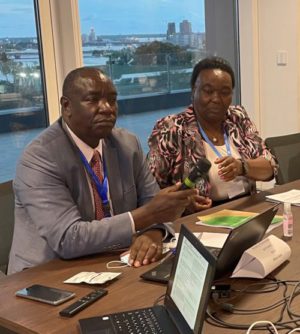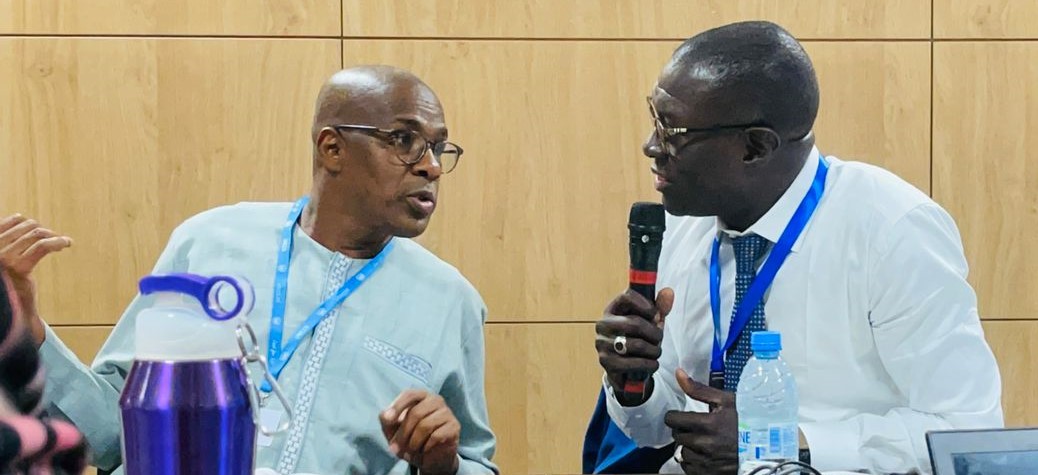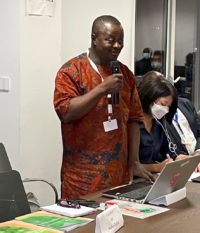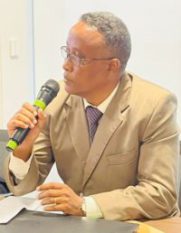The follow-up meeting of the African Initiative for Combating Desertification to Strengthen Resilience to Climate Change in the Sahel and the Horn of Africa (AI-CD) was held on the 12th of May 2022 during the 15th Session of the Conference of the Parties of the United Nations Convention to Combat Desertification (UNCCD COP 15) in Abidjan, Cote d’Ivoire. The event was attended by 30 participants comprised mainly of AI-CD Focal Points, research institutions, and the AI-CD Secretariat.
Representatives from the Horn of Africa region, the Sahel region, and AI-CD Secretariat provided updates on the initiatives of AI-CD countries to combat desertification and looked into AI-CD outcomes and challenges until the present in both Sahel and the Horn of Africa regions. The participants also discussed further steps to accelerate these initiatives towards 2030 and beyond. As a result, they shared the importance of the continuous effort of networking, knowledge sharing, and access to finance by AI-CD participating countries.
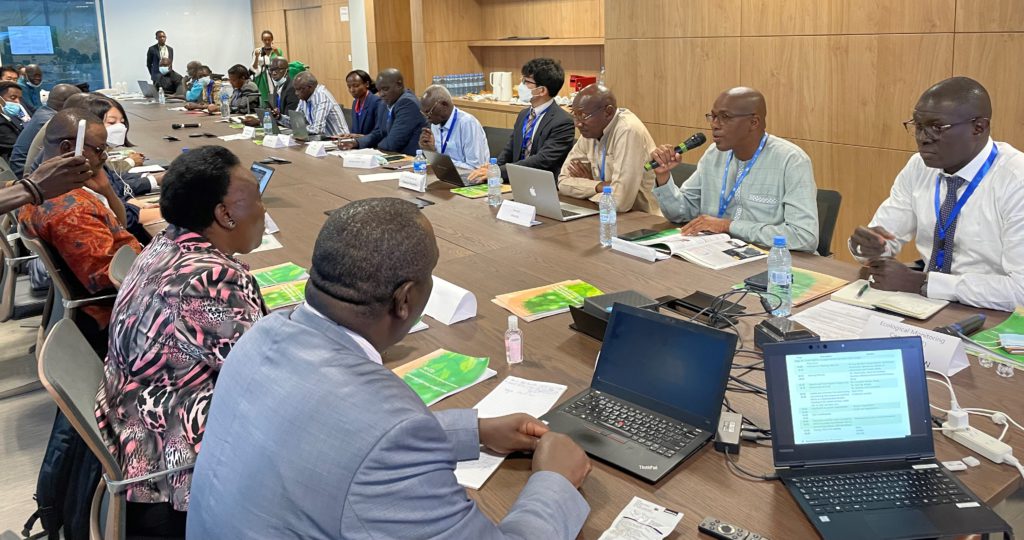
Participants in a discussion at the follow-up meeting
Highlights of the Event
SESSION 1 : Introduction and Opening Remarks
The speakers started by introducing the meeting objectives and highlighted the importance of looking back at what AI-CD has done, and reflecting on these points for the next steps.
- Mr. Alfred Gichu (left side) and Dr. Lucy Ng’ang’a(right side) delivering the opening remarks and introduction
- Dr. Cheikh Mbow (right side) giving his speech as Chair of the meeting
Dr. Cheikh Mbow, Director General of the Ecological Monitoring Centre (Senegal), who chaired the meeting, informed that many initiatives have been implemented to combat desertification and one of those is the Great Green Wall initiative, which is at the core of the African programme in the Sahel and the Horn of Africa (HoA). He added that AI-CD is also within this framework, which creates a more integrated approach of resilience and climate change in the Sahel and Horn of Africa.
Dr. Lucy Ng’ang’a, Deputy Director of the Multilateral Environment Agreements, Ministry of Environment and Forestry (Kenya), started by referring to the achievements of AI-CD, emphasising that there is so much to learn from the technologies provided under the initiative, and this gives opportunity to take the initiative to another level. Lastly, she said, “the end of this initiative is the start of another form of working.”
Mr. Alfred Gichu, Forest Conservation Secretary of the Ministry of Environment and Forestry (Kenya), reminded the stakeholders of the commitments on global climate, biodiversity, as well as land and landscape restoration so that they should scale up efforts across AI-CD member countries. He recognised that the efforts made are not enough. He also stated that the meeting offered the opportunity to look back in terms of what they have been doing over the years, to share lessons, knowledge, challenges that they have encountered, and find the way forward.
SESSION 2: Regional and Cross-Regional Progress and Achievements of AI-CD
The AI-CD Hubs in Sahel and HoA as well as the AI-CD Secretariat reported the achievements and challenges of the initiative since 2017, and pointed out necessary steps as way forward. (Please read the article on the COP 15 side event for a detailed explanation by the Sahel and HoA Hubs.)
Ms. Josephine Wanjiku (left side) and Mr. Baba Ba (right side) presented the achievements and challenges of AI-CD
Ms. Josephine Wanjiku, AI-CD Regional Hub for HoA (Kenya), presented the achievements and challenges of AI-CD in HoA and proposed continuing the collaboration within the HoA and Sahel regions by establishing issue-based networks for knowledge sharing as a way forward.
Mr. Baba BA, Acting AI-CD Focal Point / AI-CD Regional Hub for Sahel (Senegal), presented the achievements and challenges of AI-CD in the Sahel regions and explained that it is necessary to maintain and deepen networking with all the relevant stakeholders as a way forward.
Mr. Takuya SHIRAISHI, AI-CD Secretariat (Japan) and OCG Deputy Team Leader, mainly focused on presenting the cross-regional progress and achievements of AI-CD as follows:
On networking: He explained that many events were organised at different levels: from high-level side events to regional and national workshops.
On knowledge sharing: He mentioned that there were great achievements in the HoA which materialised by the existence of guidelines and case studies. Concerning the Sahel region, the Knowledge and Policy Brief, which is presently under preparation, is expected to be finalised before TICAD 8. He also informed that Nigeria and Mali created their respective short films available on the website of AI-CD.
On access to finance: He explained that the Secretariat provided assistance to Focal Points through four steps: (1) Developing their Project Concept Notes (PCNs); (2) Preparatory meetings or consultations with International Technical and Financial Partners (ITFPs); (3) Facilitation of direct dialogue between countries and private companies/partners; and (4) Provision of a guidebook on access to finance developed by the Secretariat and made available to Focal Points.
Recommendations: He encouraged the effective promotion of knowledge sharing by compiling documents and other tools including visual information such as short films, video clips, and SNS tools. He also called for more coordination with a wide range of domestic and international stakeholders to promote project formulation.
SESSION 3: Updates, Comments from Participating Countries, and Q&A
Each AI-CD Focal Point reported updates and achievements of AI-CD in Session 3.
Mr. Dambatia Lazare Tagnabou (left side) and Mr. Michael Berhane (right side) provided updates on AI-CD activities
Mr. Kaba Diallo, AI-CD Focal Point (Mali), informed that AI-CD provided technical and financial support to his country through a high-level workshop to promote the programme in Mali. A short film was also made on desertification, which had been published at national and subregional levels.
He presented the significant collaboration with AI-CD that led to the funding of a Malian NGO project by FAO.
Dr. George Louise Tokporo Tadu, AI-CD Focal Point (South Sudan), thanked JICA staff in Juba and highlighted the knowledge acquisition experience through workshops and training in 2018. He also cited the good practices in combatting desertification shared by Kenya through the AI-CD.
Mr. Dambatia Lazare Tagnabou, AI-CD Focal Point (Burkina Faso), expressed his satisfaction for being part of AI-CD but insisted that “the initiative is not yet completed because it has sown seeds which are just germinating.”
Mr. Michael Berhane, AI-CD Focal Point (Eritrea), pointed out the interrelated problems of land degradation, desertification, drought, and food security, which Eritrea faces.
Mr. Baidy Ba, AI-CD Focal Point / AI-CD Sahel Regional Hub (Senegal), called for further support from JICA to implement practical projects on the ground.
Dr. Cheikh Mbow, Director General of the Ecological Monitoring Centre (Senegal), pointed out that all AI-CD participating countries should comment on the Knowledge and Policy Brief, since only three countries out of eight have commented on it so far.
Mr. Babacar Dia, AI-CD Secretariat (Senegal), encouraged Focal Points to keep on promoting AI-CD in their respective countries and recommended that they continue their role as coordinators of activities aiming at combating desertification. He also recommended the involvement of the private sector to combat desertification.
SESSION 4: Closing Remarks
The session emphasised the importance of continuing effort to seek funding opportunities by respective countries.
Ms. Mari Miura, Senior Deputy Director of the Global Environment Department, JICA Headquarters (Japan), expressed her satisfaction on the contribution made by AI-CD to country initiatives.
Regarding the way forward, she informed that continuing effort to seek funding opportunities, such as through the Great Green Wall and Global Environment Facility (GEF), by respective countries is important. Finally, she thanked all the participants for the work done and expressed hope that the collaboration with JICA will continue.

